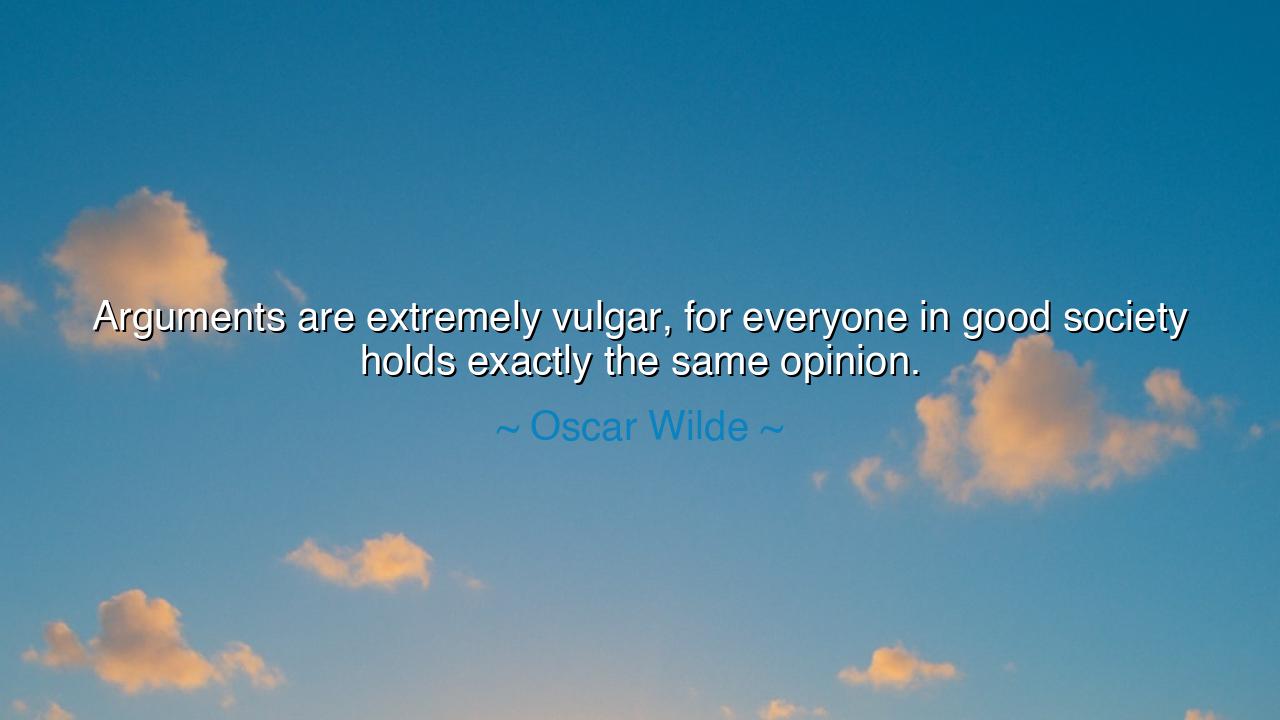
Arguments are extremely vulgar, for everyone in good society
Arguments are extremely vulgar, for everyone in good society holds exactly the same opinion.






"Arguments are extremely vulgar, for everyone in good society holds exactly the same opinion." These words by Oscar Wilde carry a deeper truth about the nature of conformity and the social pressures that govern the behavior of those within high society. To Wilde, the argument is not just a clash of ideas, but an exposure of the vulgarity of a world that seeks to uphold uniformity rather than encourage the expression of individuality and original thought. In a society where everyone is expected to hold the same opinion, to question or to disagree becomes not just rare, but unacceptable. The argument, in Wilde's view, is an act of rebellion, and its very existence serves as a reflection of a deeper flaw in society: a fear of difference, a suppressing of true individuality, and a preference for the safety of unquestioned conformity.
In the ancient world, the Greek philosophers were no strangers to the tensions between individuality and society. Socrates, the father of Western philosophy, was known for his method of asking questions, challenging assumptions, and engaging in dialogues with those around him. To Socrates, the argument was not vulgar but a necessary tool to reach the truth. He believed that only through debate, through the clash of ideas, could a society or individual approach wisdom. And yet, despite his value for the argument, he also understood its dangers. When a society is dominated by uniformity, when the same opinion is enforced upon all, the truth becomes distorted, and individual growth is stunted. Socrates himself paid the ultimate price for his refusal to conform—he was condemned to death by a society that could not tolerate the disruption of his free thought.
In a society where all hold the same opinion, true disagreement becomes an act of defiance. Wilde’s critique of the vulgarity of arguments is a reflection of his own experience in the world of Victorian England—a time when social norms and rules governed not only what one wore, but also what one thought. In Wilde’s world, it was considered not just improper but disrespectful to challenge the prevailing social ideas about morality, art, and manners. Those who did so were often ostracized, seen as dangerous or radical. Wilde, in his brilliance, was acutely aware of this, and he used his wit and writing to expose the emptiness of a society that prized conformity over creativity, individuality, and truth. To him, an argument within such a society was not just vulgar—it was unnecessary, for there was no room for genuine opposition in a world where everyone was expected to think and behave in the same way.
This idea of a society where arguments are unnecessary, and where everyone holds the same opinion, is not a new concept. It has existed throughout history, in varying forms. In medieval Europe, the Catholic Church held enormous power, and the opinion of the Church was regarded as the only truth. To argue against the Church was to argue against God itself, and those who did so were branded as heretics, often facing excommunication or worse. The Inquisition stands as a horrific reminder of the dangers of a society where there is no room for dissent and where holding a different opinion is punished. The Church’s authority was so absolute that disagreement was not simply seen as undesirable; it was seen as a threat to the entire social and spiritual order.
Wilde’s words can also be seen in the context of the political revolutions that have shaped our world. Revolutionaries throughout history, from Martin Luther King Jr. to Nelson Mandela, have stood against the uniform opinions of their societies, arguing for freedom, equality, and justice. The civil rights movement in the United States is a perfect example. The prevailing opinion of the time, especially in the segregated South, was one of racial superiority and inequality. Those who dared to question this, to argue for a different vision of society, were seen as vulgar, as disruptors of the natural order. Yet their arguments—their willingness to stand against a society that demanded uniformity—led to the greatest changes in American history. It was only through disagreement, through argument, that society could be forced to confront the truth of its injustice.
The lesson Wilde offers us is one of courage and individuality. In a world where conformity is prized, where everyone is expected to hold the same opinion, it is easy to fall into silence, to avoid the argument for fear of reprisal. But Wilde encourages us to embrace the argument, not as an expression of vulgarity, but as a tool of truth and freedom. To challenge the prevailing opinion is not to be vulgar—it is to be honest, to confront the shadows in which society hides its insecurities and its injustices. Whether in our families, our communities, or our nations, it is the arguments—the disagreements and debates—that force us to reconsider our values, to grow as individuals and as a society.
Thus, let us not shy away from the argument. Let us not be afraid to disagree, to challenge the status quo, and to voice opinions that may seem unpopular or even vulgar. For it is in questioning that we find growth, and it is in disagreement that we find the path to truth. In the words of Socrates, “The unexamined life is not worth living.” To question is to live, to confront the falsehoods around us, and to strive toward a world where true wisdom can flourish. Let us embrace the argument, for it is through our differences that we come closer to the truth that unites us all.






AAdministratorAdministrator
Welcome, honored guests. Please leave a comment, we will respond soon